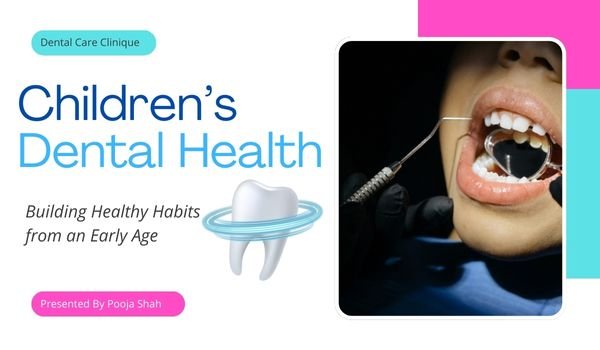Subtotal $0.00
Nurturing Healthy Smiles: A Guide to Child Dental Care
Our teeth are essential in our day-to-day activities, such as talking, eating, smiling, etc. Children’s teeth (milk teeth) are equally important for these activities; they also help in the average growth of the jaws. For healthy dental development and function, getting children involved in routine dental hygiene and maintenance at an early age is essential.

Child Dental Care: From Birth to Adolescence
●When Has the Focus on Oral Health Start?
It has to start before the child is born. Prenatal counseling for oral health is encouraged these days. As parents, it is the best time to accept new information on maintaining their child’s health well.
●When Should the Child’s First Dental Visit Be?
It can be scheduled as early as possible. During initial visits, the parents should be educated on the steps that should be taken to maintain oral hygiene.
●Is It Essential to Visit dentists before My Child gets teeth?
Yes, since the parents need to be well informed about the hygiene of gum pads (the area where the teeth erupt in the future.)
● How Do I Maintain My Child’s Teeth? Is It Different at Different Ages?
Yes, oral health maintenance changes are based on age.
Hence, we have a detailed breakdown of maintaining your child’s oral health according to age.
● The Infant (2months – 1 year)
•By the time the first tooth erupts in the mouth, start cleaning using a damp washcloth wrapped around the index finger and clean the teeth and gum pads once a day
•As more teeth erupt, use a small or soft silicone finger brush.
• Non-fluoridated toothpaste can be used. The amount should be no more than the size of a grain of rice since the child is not expected to expectorate.
● The Toddler. (1-3 years)
• The parent is responsible for adequate dental hygiene. Parents should approach brushing systematically, beginning with one area and then progressing up. Use a Damp, soft, bristled brush.
•The child’s attempt/effort to try to brush should be encouraged. However, the parent has to understand they wouldn’t be able to brush themselves well, and it’s upon the parent only to brush.
•Also, at this age, the child would not be able to expectorate well, so a pea-sized amount of non-fluoridated toothpaste is to be used.
•Parents must take the child for routine dental checkups once a year.
●Early School (3 years-6 years)
•Child must be encouraged to maintain their teeth to brush and floss themselves routinely.
•The child must be taught to grip the brush well and brush their teeth using the fones method
•They can spit out well now and can start using fluoridated toothpaste
•The responsibility of the parent regarding the child’s oral health has begun to shift on the child. However, it has to be a smooth transition; parents must monitor well on the child while brushing.
•Parents must assist while flossing
•Must go for a dental checkup annually.
•School Age(6-11 Years)
• This is the phase where complete manual dexterity is achieved. Hence children can brush and floss independently
•However, parents can demonstrate using plaque-disclosing pills post-brushing if any plaque is left on teeth.
•Children can go for a dental checkup twice a year, as now the mixed dentition phase has started
•An orthodontist checkup is also recommended to prevent growing jaw abnormalities at this stage.
•Pre Adolescent and Adolescent (11-17)
•Children must brush and floss twice a day by themselves
•must go for dental checkups twice a year
After all the permanent teeth have erupted, you must have an orthodontist consultation once.





Comments are closed